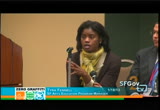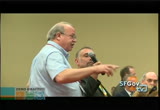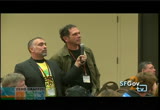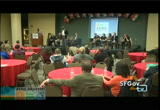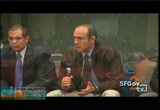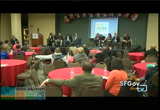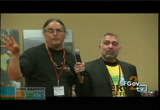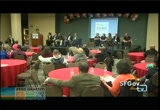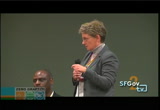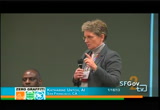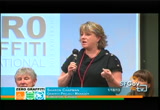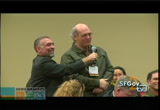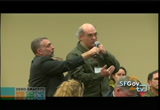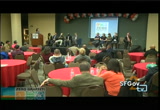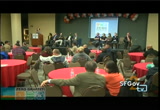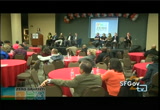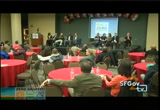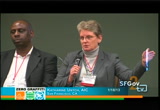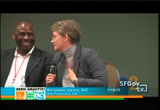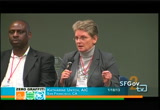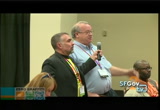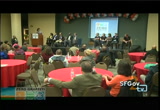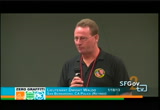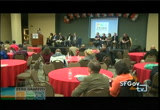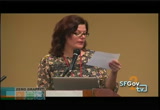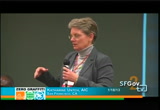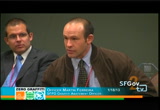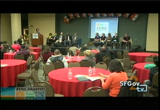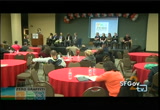tv [untitled] February 10, 2013 4:00pm-4:30pm PST
4:00 pm
them safe and also we let the police -- law enforcement know this program is happening and when it's happening so that they're hypersensitive to it. >> i'm going to go back over here and we have a couple comments. i think we're going to stick with this topic a little bit because it looks like there's a lot of interest. i'll get back to you after this gentleman back here. and i'll hold the mic and you just speak into it, okay, sir. let me get on this side of it and go ahead. >> don't wait until somebody gets assaulted like i did. make sure you're proactive about that issue. since i was jumped in june, what we do is a recon so we know where all the gang tags are because they're a problem. so, i make out a list. i draw out a map. i know how to hit them in 45 minutes or less. i want my officers back out on the street.
4:01 pm
i don't want them baby-sitting me. but i never go in alone again. i carry some protection. i get a three-vehicle escort. our police department is all behind this. i use magnetic signs on my vehicle now and i always wear a safety vest. never go alone. we set up five different conditions to do that so we never have a repeat. it's not worth it. >> he's from hayward. >> he's in hayward and i'm going to come over to gideon unless anybody else there has a response to this. gideon if you'd like to stand up. >> i'd like to ask about, there are three pernicious forms of graffiti that in some ways have actually gotten worse. as the city of san francisco has greatly improved the graffiti situation, i've noticed that there's more graffiti on concrete, on sidewalks, on curbs and also on
4:02 pm
trees, tree trunks. and tree trunks, graffiti on trees to me is the lowest form of graffiti that there is because it just -- it is so lacking in any consciousness about the environment and life and so forth. so, i'm wondering when i was in a graffiti advisory board, several of us tried to get some special attention paid to those things as well as glass etching. i don't know if glass etching has gotten worse or not, but particularly graffiti on concrete sidewalks and curbses and trees. i'm wondering if perhaps officer parerra [speaker not understood] can speak to that if any special efforts are made to address those. >> i'll speak to it. when we invoked the blight ordinance, we recently had it changed. we have now put that -- we were doing it as a department. we were doing the abatement for the sidewalks. sidewalks are actually private property. so, we have now changed that
4:03 pm
and put the property owner responsible for the graffiti on the sidewalks. that may be why you're seeing a slight increase. the department was doing that all over the city. as resources dwindled, and we recognized we were already noticing the property owner put private graffiti on their property, we added the sidewalks. so, that may be a reason why you're seeing that increase. and graffiti on trees, we recognize that as a problem. and as we have not as yet come up with an idea or solution on how we can change that. >> anybody else want to jump in on this? >> i can't tell you, i've never seen a police report involved graffiti of a tree. and i'm not saying people shouldn't report it. it just doesn't get reported. and if i recognize a tag, if it's brought before me, i'm going to do my best to deal with it or they're going to do their best to deal with it at station level.
4:04 pm
but it's just not something that's reported on the internet or counter reports or patrol officers. >> just to follow-up what marty talked about. unless there is a report, we're not going to know about it. we're not going to be able to address that issue. in terms of graffiti on concrete, the majority of the ones i've seen so far have been along the lines of the stencil graffiti. those create a little bit more of a challenge for us in terms of prosecution. it is definitely something marty and i stay in contact about. everything is coming up. there's always changes. so, it is something we're trying to address as it's coming up. >> i'll add one thing to that, too. the stencils that are going on the sidewalks, and if they have permission by the property owner to do them. we have goldfish all up and down haight street. but permission by the property owners. so, that goes into it also.
4:05 pm
>> there will be a yellow brick road somewhere, too. we're going to go -- do you want to respond to this? >> i'll respond very briefly. my experience with graffiti vandals is that they are actually quite smart and adaptable. if they know that the graffiti on the sidewalk is staying because something has changed their responsibility or accountability, they will target your sidewalks. what i would say is don't wait for people to report it. because they may not know that it's not permission. they may not know they have a right to report t. they may not want to upset their neighbors, their fellow business people. if you see it, by law enforcement or code enforcement officer, city staff, committee member, change the culture. if the graffiti starts showing up on your light poles you're not used to paying attention to that, they will know that, the graffiti stays there, they will target your light polls. we went from zero on light polls
4:06 pm
in van kao to hundreds and hundreds. 85% of those tags were done by one person. poles * >> [speaker not understood]. >> of course. i'm going to ask you to stand up first and then you add to it, okay. >> okay. in oakland we're getting sidewalk stuff. and word on the street, we don't cover it up. so, exactly what you're saying. the word on the street -- and part of it is you're driving -- i don't notice as i'm accuweathering. moev of us are cruisers. we get what we see. that's an issue coming up. these people are networking. they spread the word. sidewalks are cool game, trees are cool, they don't touch that. you're exactly right. i experience in my own life. we're going to have to open people, we're going to have to focus on sidewalks unfortunately. >> if i can just add, we're a network, too. this is a network. your city is a network. the city is networking with the police, with the business units, with the volunteers,
4:07 pm
with the seniors groups, with youth groups, whoever is walking those streets, cleaning those streets, going down there to enforce by law and properties, they all need to be paying attention to these things and it can be as quick as a saying. recently we've noticed x is happening. we're asking you to report it to this department, this person so we can proactively deal with it. it's the same thing if you guys are getting internet viruses or some kind of criminal behavior happening through your network. they inform you of it. and it's the same thing. it's about a network, it's about getting into those back and everybody paying attention. and that's what i would suggest is get the information out there. >> the great thing about san francisco, because we have one number, 311. and you report it to 311 and we can take care of it. is this dealing with still the graffiti on the sidewalks? we'll go to a written question and then we'll come back to one of your questions, okay. >> this is in regards to abatement.
4:08 pm
graffiti shadows plagues san francisco and cities around the world. and san francisco there is a need to have an education campaign to identify heritage buildings following the model of the city of edmonton where it is done in coordination with the heritage society. do you have suggestions to accomplish this in san francisco? i guess this is the san francisco folks. >> yeah, i think there is already. i'm the expert on the materials, but i think there is a system through your 311 calls here in san francisco, is that for example, if it's on art, it goes to the arts commission and they have a different way of addressing graffiti abatement. and i believe with historic buildings and structures it should be the same. i don't know if it is or not. but that's a really good point because sometimes the approach for addressing a paintment on a historic or cultural monument
4:09 pm
or building is going to be a little bit different than approaching it on a replacable cement or brick wall. so, making the coordinations is going to be very important. the point i think that you are addressing in your question about the shadowing is i think the effort that's behind that question is to try to work towards getting qualified people in to removing. a lot of times with the historic, you're not going to be painting over to remove a tag. you're going to be trying to get a paint binder and pigment or ink system out of something that's pourous. and the concern i think is that if somebody is not experienced or well qualified on how to do that, it can make it worse and sink in and then you have worse problem trying to get back out again, right? that's what you're addressing. * so, i think a point behind that is to try to make sure that
4:10 pm
you're working with -- it's just a matter of clarifications. finding an architectural conservator, finding somebody who does a lot of graffiti abatement on say masonry or whatever the substrate has to be so that you don't end up with or you can minimize those shadows and end up with a better end result. hope that answers the question. >> what we do in the city of edmonton, our contractor that's hired to work on all city clean up as well as our clean up program on private property, we ensure that when we tender the contract for our contractor to do all of our graffiti removal, part of the award for the contractor is prior to them getting the award. they have to get approval from the heritage department. basically they have to have a letter in place. so, basically what we do is they have to go and get a -- do
4:11 pm
a cleaning test for the heritage department so that they can provide a letter to us and otherwise they don't get the contract. that's one way we've been able to do it, through a tendering process, to make sure they have the appropriate qualifications. >> okay, thank you. let me come on over here. that answered that question, and we're going to come over here to alex who is on the san francisco graffiti advisory board. if i can get you to stand up, alex. >> thank you. thank you for answering. that was my question. but i have a follow-up question that actually goes to dpw. you hold the microphone? >> i hold the microphone that way i can pull it away at any minute. [laughter] >> currently the way i understand it is whenever there is a graffiti on a -- the great majority -- and by the way, we have plagued on this issue here
4:12 pm
in san francisco. we're talking about hundreds and hundreds of buildings with this issue. basically with brick surfaces where the property owner will get a citation for the violation to remove the graffiti. they send an untrained personnel to try to do it. they are not successful and they leave a graffiti shadow behind. as far as i'm concerned on an esthetic point, it is exactly the same of the graffiti that was there before. the only difference is that you took a little bit of the pigment, but even worse. many times the personnel that tried to abate it is damaging the building, we just explained, by putting the pigment further in in that substrate. and -- or even worse, actually really dee facing the surface. when it's historical heritage buildings, there's no return
4:13 pm
unless you do a major restoration. and this is what i don't understand. the citation is fulfilled just because that pigment on the surface was taken, but the design is still there. a good example is van ness and ellis not too far from here. and there is a corner building, beautiful one-story brick building. and you see shadow over shadow over shadow. i think it's -- to me, it's almost like the vandals are laughing at us. >> larry, did you want to respond to that? >> yeah. so, we photograph all the tags and the inspectors go out and look at them. if the actual tack has been removed, then the graffiti is considered removed. the fact that the ghosting stays there, it becomes a very difficult thing at what level you're going to hold the
4:14 pm
property owner responsible. * tag for removing the ghosting. a lot of times that's not very easy to do and, so, are you still going to hold them accountable when they've made the effort, removed the initial tag? and they can't remove the ghost, i don't think so. as a city, i don't think that would be where i would want to be. if they showed they made the effort to remove it, unless it's extremely bad, i think they're doing their due diligence to try and remove the graffiti. >> all right, thank you. do you want to -- is that one red or is that -- because there was red and it was asked by the same person. >> it was red and then asked by the same person. >> you know what, i can see a bunch of hands up here. iv see this guy back here with his hand up a couple -- a half hour now. if i'm going to be honest about it. so, we're going to have him ask your question. >> yeah, this is to dpw, but
4:15 pm
how do you cite your owners? do you wait till somebody calls in a complaint or as your crews are out there cleaning up graffiti and they see graffiti on a private property, do you note that and then send them a citation, or do you just wait for the residents to complain about it? >> both. all of our staff, field staff are trained to call into our radio room whenever they see graffiti on private property. we have corridor workers that work the major commercial corridors throughout the city. they also call it in. and we also take calls from 311. >> okay, thank you, larry. and i see a bunch -- well, two hands back here. so, we're going to go ahead and have them step in and ask their questions. >> for dpw, regarding the ghosting, typically when that happens, do you have individuals that are actually trained in the removal and how
4:16 pm
to remove it properly? because based on the material that's actually being placed on the wall and the wall that -- the type of wall that is being placed on, do people just go out and have one particular product that they put on and expect it to come off, or is there some training that's going on to find out, okay, this is the application we need to use for this surface and this is the, you know, a different application we need to use for another surface? and how can you prevent that ghosting? because if it's still there, it's there. just because you remove the pigment doesn't mean that it's gone. and like you stated yourself, when do you say, enough is enough? because if you have an historic building and you want the graffiti removed but you have the ghost there, is it really removed? >> well, historic buildings, dpw would not be removing the graffiti. and remember also on private property, the property owner is responsible for it. dpw as a rule does not do the abatement. so, whether they are or aren't
4:17 pm
using the correct materials to remove it off of brick, it's based on who they hire or who they get to do the work. we are aware for the time when we did do t we have several different products based on the type of surface. and staff was trained at that time, but that's when we were doing abatement on private property. >> i can just help a little bit. again, from the historic building perspective, of course, private property can be historic, too. but there's a difference between, of course, when it's a public owned building or private owned building. perhaps some of it is an awareness or an education about resource he he that are available. there's a whole gamut of people available to remove graffiti, people who have never done it before, maybe they're painters but they just have access to materials and they are used to taking paint off. i guess farther down the spectrum of people that have never done it before and just
4:18 pm
want to be good citizens to remove graffiti. then you go up through -- you know, people who just specialize in graffiti removal. there's people who, you know, more like me who get technically involved and we test everything. you've got vendors out there that are selling you products, including antigraffiti coatings. so, i think there's a level of what the significance of the historic building, if we're talking about the white house or the national monument, you know, we'll always get -- usually find people who are super well qualified. and then if it's -- you know, if it were my house and it was built in the 1920s, i might get more ghosting. it's just a matter of -- not me. i would do a good job. [laughter] >> but i think there's a whole spectrum there. and sometimes it's just a matter of understanding what the resources are and awareness of the resources so you can find the people that can help
4:19 pm
maybe reduce the ghosting in the first place because, honestly, once you get ghosting, forget it. i mean, and i should say, too, you know, i have almost 30 years' training in materials and methods and everything and i work specifically on, you know, i've worked in museums. i still get ghosting every once in a while. it's not a perfect world. it is really tough not to -- the damage is done when the graffiti goes on. so, sometimes we have to realize that, too. and we're just -- we're fighting an uphill battle in trying to find the right materials and methods in order to, you know, remove or abate. just one quick comment on antigraffiti coatings for those in the talk. this is a repeat. but we have to be very careful in selecting those materials and methods as well because sometimes just the coating alone can do more damage to historic fabric than not having it. so, we have to be looking at other strategies besides what i call it, what glue do i use. we have to be looking at strategies more on the prevention end.
4:20 pm
are we using motion cameras, lighting, sprinkler systems, relandscaping, fencing. the more we do, the more successful we're going to be. * on the preventive end >> we'll have a quick question, hear from chuck and i know there is a gentleman over there that has had his hand up. go ahead, chuck. >> we have an award winning mural program in the city of hayward, but we have one real strong block and that's dealing with at&t and their control boxes. they will not allow us to touch them. never mind the fact that volunteers have already put 20 coats on that box, okay. they do not want to put a single mural on any one of their boxes. has anybody had success with them? have you got any suggestionses? because we're tired of painting those boxes. they threatened to sue our city when they tried to get them involved in the mural program. >> i think the one suggestion i
4:21 pm
might have for you is you start documenting the number of times that you're actually painting out there box and you start generating a bill along with a letter and send it to them. i think that's probably your best strategy so you can show the amount of cost that you're actually spending abating something that's theirs. and from that point then you have to have your policy makers or engage them. i mean, because that's pretty much -- >> [inaudible]. it's not unique. trust me, it's not unique. >> [speaker not understood]. >> all right, you have another one for us, another anonymous question. >> so, this is in regards to enforcement. do you take juvenile gang bangers to paint over gang graffiti? any law enforcement? >> we do. >> do you? >> [speaker not understood].
4:22 pm
>> take the mic, walk it over. >> tagging is tagging. if you're set for work release or work service, community service, [speaker not understood]. now, our -- when we're doing a lot of volunteers, we had to go with it because we had a nonprofit to clean up. when they did our clean up, they were actually reformed gangsters themselves. they had opened a nonprofit and they were doing paint overs. they were pretty astute at assessing the juveniles and assessing the areas they were in. what we've done since then, we lost our nonprofit, now everybody who does graffiti, we generally send out, not the paint, we send out to strip the toilets and public parks, pick up dog poop at the dog park. pick up something that was disgusting and they don't get a chance to paint at all. we would see where they would
4:23 pm
paint over and they would forget the part with their gang and they would paint over. they would use a roller and put stuff behind. we've done that. we've only walked away from it only because we haven't got what we consider the proper supervision to go out to be able to assess the environment and the young gangsters that go out on the paint crew, they respect the old veterans even if they've gotten reformed. they don't so much respect the city work [speaker not understood]. that's how it worked with us. >> okay, anybody else up there want to comment on that? i'm going to run over here because it's over here. had his hand up for a little while. if i could get you to stand up. >> this is a softball for dpw. i want to know where you get the funding that you give out as grant funding, let's say street smarts. is it general fund money, is there a special fee that's tied to something that goes into a
4:24 pm
fund? >> yeah, it's general fund money. the department makes a decision on programs and we earmark money for various, like the police and the arts commission and we earmark money and send it to them. a lot of times you'll find the board of supervisors members have support for various programs also. we've gotten that after the budget was done in order to fund some of the programs. >> great. do you have another question? >> i have three more. >> you have three more up there, and anybody else going to be wanting to ask a question? okay, we'll get you lined up, then. >> let's see. this is to sharon. your capital city clean up program offers $1500 to private property owners to abate on heritage properties. what are the technical requirements to abate graffiti from heritage properties? >> i actually am not an expert
4:25 pm
in terms of the types of chemicals. so, i really captain answer that question. basically like i said before, we have our contractor on staff who is fully qualified, who is responsible for getting a letter approval through heritage for his chemical. they have to do a test with them to ensure that the products are safe for use on all heritage buildings. and so that's how we've been able to handle our heritage buildings. >> i think most of my experience here in the states is it has more to do with the qualifications -- if it's designated listed historic property, then it tends to shift over to the qualifications have to be somebody that has a certain degree and conservation or that kind of thing. so, it's probably similar. it's some qualification type program. >> alrighty, thank you. i have a question over here.
4:26 pm
somebody get back here, if i could get you to stand up. your name is frank? >> yes. i've got two questions. one for marty and one for larry. marty, how many officers do you have dedicated to your graffiti program? and also larry, how many painters or staff is in your graffiti abatement program? >> great questions. >> well, i'm the graffiti guy, graffiti abatement guy. [laughter] (applause) >> as far as the guys i use on my paint overs, i have a group of 3 to 4 guys and i pick them -- they're hand picked by me. i tend to pick guys who are patient, good with kids, guys who are school resource officers. that's a big plus. you know, you've got to like kids, maybe have experience in teaching, coaching, working with kids. like i said in my presentation, you don't want the guy with the
4:27 pm
rack shock and smoke mirror glasses who looks like he's working on a chain gang. you want someone who can maybe not talk to them in their own vernacular, but who can see eye to eye with them, talk to them about kid things and most of all be patient. and who can document trouble and kind of see things on the horizon that might be issues coming up and who are familiar with the san francisco landscape. you know, i don't let just any cop come and do the overtime. very, very picky about who i get. and i get guys who are dependable and who are most of all good with kids. >> larry, part 2. >> about 18, roughly about five crews that go out total. but they remember their main focus is public, not private.
4:28 pm
so, in short that's the answer. >> [inaudible]. >> all public property. so, light poles, signal boxes. we do mailboxes, stickers, trees. garbage can. >> trash cans, yeah. >> [speaker not understood]. >> public. >> yeah, city property. the benches in the parks. we don't do parks, but parks are done, rec and park does the benches he. we have some pretty basic colors. * so, most of our furniture is probably one of four colors. it's all going to be green. >> okay. let's see, what am i going to do?
4:29 pm
we're going to do this 15, 20 more minutes because i know mel needs to leave in a little while. we were going to go to about 4:15 but we're cut short a little bit. we'll do a ten-minute break after that and we'll kickoff some awards for people that are deserving. so, i'm going to take another question from gideon, gideon cramer, former member of the san francisco graffiti advisory board. and let's hear what you have to ask. >> this is a follow-up question for larry. we were talking about concrete sidewalk graffiti and curbs. and your response was that that is private property or the owner -- the property owner is responsible. a number of my neighbors had asked me when they had graffiti said where do we go? technically you're responsible. so, what am i going to do? they ended up -- i said, do not paint over it. it's got to be power washed. you have to use -- that can be
90 Views
IN COLLECTIONS
SFGTV2: San Francisco Government Television Television Archive
Television Archive  Television Archive News Search Service
Television Archive News Search Service 
Uploaded by TV Archive on

 Live Music Archive
Live Music Archive Librivox Free Audio
Librivox Free Audio Metropolitan Museum
Metropolitan Museum Cleveland Museum of Art
Cleveland Museum of Art Internet Arcade
Internet Arcade Console Living Room
Console Living Room Books to Borrow
Books to Borrow Open Library
Open Library TV News
TV News Understanding 9/11
Understanding 9/11